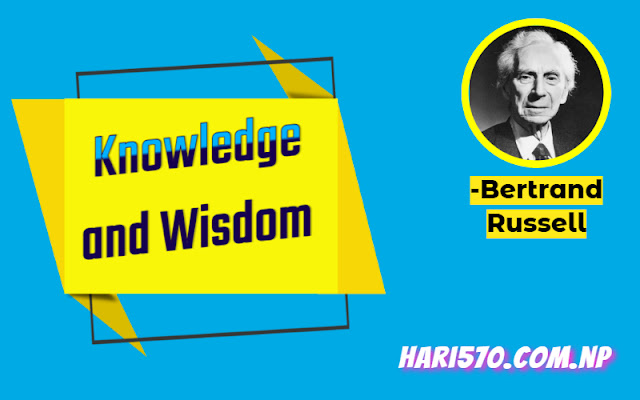
Summary of the Essay Knowledge and Wisdom by Bertrand Russell Class 12 English
About the Author:
Bertrand Arthur William Russell (1872–1970) was a British philosopher, logician, essayist and social critic best known for his work in mathematical logic and analytic philosophy. His most influential contributions include his championing of logicism (the view that mathematics is in some important sense reducible to logic), his refining of Gottlob Frege’s predicate calculus (which still forms the basis of most contemporary systems of logic), his defence of neutral monism (the view that the world consists of just one type of substance which is neither exclusively mental nor exclusively physical), and his theories of definite descriptions, logical atomism and logical types.
Summary:
Russell distinguishes between knowledge and wisdom in this essay. Wisdom and knowledge are not the same things. Russell defines wisdom and lists many methods for attaining it. He laments the fact that, despite tremendous information, there has been no equivalent rise in wisdom. He defines knowledge as the gathering of data and information, whereas wisdom is the practical application and use of knowledge to produce value. Not simply memory, but also study and actual experience, leads to wisdom.
Russel defines wisdom by describing things that contribute to wisdom. The first is a sense of proportion. It is the ability to carefully analyze all relevant variables in a problem. Specialization makes it difficult. For example, scientists discover new drugs but have no idea what influence these medicines will have on people’s lives. The medications may lower the newborn mortality rate. However, it may result in a rise in population. Food shortages may occur in poorer countries. More population may result in a worse standard of living. A maniac could use knowledge of the atom’s composition to destroy the world. Without wisdom, knowledge can be dangerous.
Knowledge should be linked with humanity’s overall requirements. Even comprehensive knowledge is insufficient. It should be associated with a specific understanding of life’s purpose. The study of history can help to demonstrate this. For example, Hegel wrote about history with great historical knowledge, yet he encouraged the Germans to feel that they were a superior race. It resulted in the war. As a result, it is vital to blend information with feelings. Men who have information but no sentiments are illiterate.
We require wisdom in both public and private life. We require wisdom to determine our life’s purpose. We require it to be free of personal preconceptions. We may inappropriately pursue a fresh idea if it is too large to achieve. People have sacrificed their lives in search of the “philosopher’s Stone,” also known as the “elixir of life.” They were not practical. They were looking for simple solutions to humanity’s complicated challenges. A man may endeavour to accomplish the impossible, but he may endanger himself in the process.
Similarly, wisdom is required in personal life to avoid hatred for one another. Because of their prejudice, two people may remain enemies. One may hate the other because of imagined flaws. They may become buddies if they are told that we all have flaws. Russel argues that we can avoid hatred by reasoned argument. The path to wisdom is to release ourselves from the grip of our sense organs. Our ego grows as a result of our senses. We cannot live without our senses of sight, sound, and touch. Our senses are the primary means by which we see the world. We learn as we develop that there are other things. We begin to recognize them. As a result, we stop thinking of ourselves as individuals. When we start thinking about other people, we become wise. We let go of our egoism. It is difficult to eliminate selfishness totally, yet we may think beyond our local circumstances. Wisdom emerges when we begin to place value on things that do not directly affect us. When we begin to love people, we begin to gain wisdom.
Wisdom, according to Russell, can be taught as an aim of education. The tale of the Good Samaritan teaches us to love our neighbour, whether friend or enemy. Many times, we misunderstand the point of this tale because we stop loving those who cause harm to society. Understanding, not hatred, is the only way out. In a nutshell, Russel advises us not to hate anyone. The author uses historical examples of Queen Elizabeth I, Henry the IV, and Abraham Lincoln who were free of the mistakes made by other notable persons in the past. In the course of imparting knowledge, the hazards of hatred and narrow-mindedness might be highlighted. Russel believes that knowledge and values can be blended into an educational plan. People should be educated to see things in context with other aspects of the world. They should be encouraged to consider themselves global citizens.
In conclusion, the author lists five factors that lead to wisdom. They are as follows: comprehensiveness, proportionality, emancipation, impartiality, awareness of human needs and understanding. As our knowledge grows, so does our ability to do evil. We would need more and more wisdom to make appropriate use of our knowledge. To make excellent use of our growing knowledge, we need more wisdom. Only then can we realize our life’s purpose and fulfil our goals.
Wow! very meaningfully you have summarised this essay. And you have done great justice on its view.
Brilliant!Thank you bruh..
how long summary